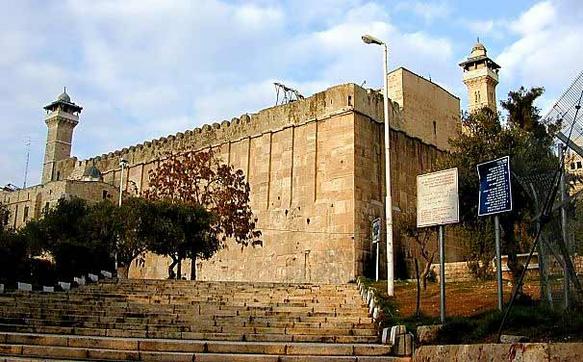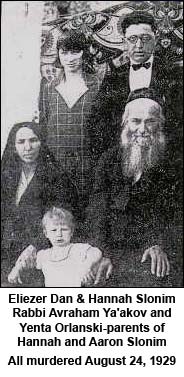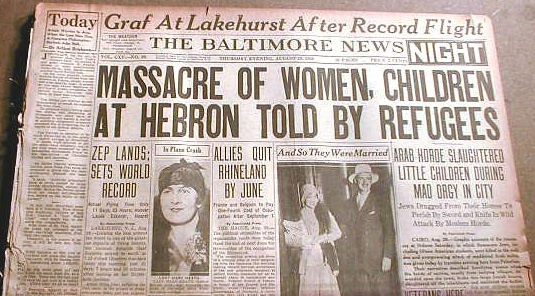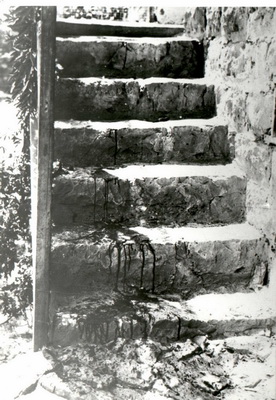
| THINK-ISRAEL |
| HOME | July-August 2009 Featured Stories | Background Information | News On The Web |

Hebron (Chevron in Hebrew) was the first piece of land ever purchased by the Jews in Israel. Approximately 38 centuries ago, Avraham, our forefather purchased a cave in in Chevron to bury his beloved wife Sarah. Jews have owned land in the city pretty much from then till now.
In 1929, all that changed. Friday night, Rabbi Ya'acov Slonim's son invited any fearful Jews to stay in his house. The rabbi was highly regarded in the community, and he had a gun. Many Jews took him up on this offer, and many Jews were eventually murdered there.
As early as 8:00 a.m. on Saturday, the Jewish Sabbath, Arabs began to gather en masse. They came in mobs, armed with clubs, knives and axes. While the women and children threw stones, the men ransacked Jewish houses and destroyed Jewish property. With only a single police officer in Hebron, the Arabs entered Jewish courtyards with no opposition.
SIDE BAR: Eyewitness to History
The following are eyewitness accounts of the events leading up to and including the Hebron Pogrom of August 23 - 24, 1929. The accounts were recorded and published within a time frame that would eliminate any doubt as to the validity or detail of the testimony. As one can see from the sources, we can also eliminate the possibility of "Zionist right-wing extremist propaganda."
Source: Maurice Samuel, What Happened in Palestine
Dr. Elkana of Hebron:
An unidentified Jewish resident of Hebron:
Davar newspaper of August 20, 1929:
Excerpted from a telegram from the Arab Executive to the British High Commissioner for Palestine (after the pogrom):
From the Memorial Book of the Jewish Community of Hebron:
On Friday morning, the day of the outbreak in Jerusalem, the Jews of Hebron were already alarmed. The day before, Aref el-Aref, Arab Governor of Be'ersheva, had been in the City and had preached in the Mosque (Ha' Machpelah). His words were repeated to the Jews; in the midst of open incitement to riot recurred those familiar and sinister words: "The Government is with us!"
The visit of Aref el-Aref to Hebron on Thursday bore very early
fruit. On Friday morning the Jews of Hebron received, from an Arab
source, the news that the Arabs were arming. Rabbi Ya'acov Slonim,
head of the Sephardic Jewish community, and Rabbi Frank, head of the
Ashkenazic community, turned to the Arab Governor of Hebron, Abdullah
Kardos. The Governor calmed us and said: "There is no fear of anything
happening. The British Government knows what it has to do. In the
place where two soldiers are needed, it sends six." And he added: "I
tell you in confidence that they have many soldiers in the streets, in
civilian clothes; these soldiers circulate among the crowds, and in
the hour of need they will fulfill their duty."
On Friday afternoon, an Arab mob broke into the Yeshiva, and killed the only student who had remained there - Samuel Rozenholtz, known among the Jews of Hebron as a matmid, a name given to those who distinguish themselves by their devotion to study. On Saturday morning, before the slaughter began, the Rabbis again appealed to the Governor for help. Again they received the same astounding assurances. Bewildered, they turned to Mr. Cafferata, the British officer in charge of the Police. From him, too, they received assurances of safety. I find such difficulty in believing this story, that I have looked at every record of eyewitnesses, without finding a contradiction.
For two hours on the morning of Saturday, August 24, there raged in Hebron a scene which is not easy to parallel even in the medieval annals of the Jewish people. For two hours neither the Governor of Hebron nor the British officer interfered. From English papers I cull a story of the heroism of Mr. Cafferata in attempting to stop the massacre.
British newspaper reports speak of Mr. Cafferata being decorated for "heroism." However, Mr. Samuels could not find any accounts of such heroics or even any attempt to stop the attack. The author does state that a certain Commander Partridge of Gaza treated the wounded and dying. The Memorial book and survivors does mention the heroism of some of their Arab friends and landlords: "The family Moshe Masha, the family Borowsky, the family of Rabbi Slonim, the family Schneersohn were thus rescued." They recall even the unsuccessful efforts of one Arab, Nassar El-Din, to protect Jews in his own home. However, with regard to Mr. Cafferata, both the Memorial Book and the testimony of the survivors record, with damning unanimity, that Mr. Cafferata did nothing for two hours. The Memorial book records:
One eyewitness stated:
The Memorial of the Jews of Hebron,
In the name of sixty-five slaughtered, fifty-eight wounded, and many orphans and widows; in the name of the remnants of the plundered and tortured we accuse:
2. The Governor, Abdullah Kardos, and the Commander, Cafferata, who deprived us of the means of appealing for help and defence, betrayed us with empty promises and gave the murderers and robbers their opportunity.
3. The police, which did not fulfill its duty, and behaved with contemptible baseness.
4. The emissaries of the Mufti and the Moslem Council, in particular the Sheikh Talib Narka and his colleagues, those mentioned above, as well as those who have not been mentioned, who proclaimed the massacre and permitted murder and rape.
5. Also the inhabitants of Hebron (with the exception of some families) who did not rise up to help their brothers and neighbors in accordance with the commandments of the Koran...
Source: Pierre Van Paassen,
...the Holy Land was in turmoil. Life came to a standstill as the ordinary safeguards of government ceased to function. The mob, in itself not very numerous or impressive, dominated the scene. Sir John Chancellor, the High Commissioner, was on leave of absence, and his place at the top had been taken by Harry Luke, the Chief Secretary, as Acting High Commissioner.
This gentleman appeared to be in a blue funk (disappointed, nervous) in the first days of the rioting, when I called on him at Government House in Jerusalem. "The situation has gotten out of hand," he repeated over and over again, "and just at a moment when there are no troops within easy call."
I asked him if there were no arms on hand either.
"Plenty," he said.
"You could arm a few thousand Jews. They are being attacked by people who seem to have plenty of arms. It would be logical, in view of the fact that the government does not possess the means to protect them, that they be allowed to defend themselves."
"But that would mean civil war," objected Mr. Luke.
"Well, you pretty well have a civil war on your hands as it is."
"We, the government, would merely become a third party of disorder if I carried out your suggestion," he said.
"Disorder? By suppressing disorder you do not become disorderly," I remarked. "The Mufti's clique is the party of disorder, The Jews, whatever your objection to them may be, are the party of order. I have looked at the Arab rioters in Jerusalem, Hebron, Safed, and elsewhere. They are the lowest dregs of the population, uncouth hooligans, gangsters and cutthroats. As against them the Jews represent civilization here."
"Ah," he objected again, "but you must keep in mind that the government is neutral, must be impartial in this quarrel between Jews and Arabs. We are the watchdog..."
"Neutral and impartial when it is a question of barbarism versus civilization, when it is a case of gangsters attacking peaceful innocent citizens as those whose bodies I just saw piled up in a house in Hebron? .... Can one be neutral in a case like that? Isn't being neutral in such a case, tantamount to taking sides, if one leaves the way open for more attacks, more murders of women and children?"
"By the way," Mr. Luke broke in, "are you a Jew?"
"No," I answered, "must one be a Jew to want fair play?"
"What then do you suggest?" he asked.
"I can suggest nothing," I replied, "I am only a newspaperman looking on ...."
"Quite so," he came back, "But you could be immensely useful to the government of Palestine. You represent a great liberal journal in America (the late New York Evening World), and we are very sensitive to American public opinion. I want you to have full facilities to probe the matter, to find out what really happened here, and to tell in what a grave predicament the government of Palestine was placed, caught between two fires, as it were..."
"But I cannot say that," I returned. "You have just said the government is neutral. I can never hope to explain to the American newspaper reader that in the presence of an unprovoked attack by gangs of hoodlums on a peaceful community, the government looked on as an impartial spectator. Americans won't understand that. They expect something else from a government."
"What, for instance?"
"Well, a whiff of grapeshot, for instance - a few volleys fired into the air by the police ... you can't be neutral in a case like that."
"Well, no, but impartial we are..."
"You call that impartiality when a man like Captain Caffaretta of Hebron comes in and calmly relates how he watched the mob invade a rabbi's home and slaughter twenty-seven persons there."
"There were only twenty-six killed," interrupted Mr. Luke.
"Yes, twenty-six adults and one baby of three months, that makes twenty-seven by my count .... Watch human beings being killed, he an officer in the British army, with a police guard at his beck and call and a service revolver in his pocket. One or two shots in the air by Caffaretta, and the mob would never have entered Rabbi Slonim's house."
Shlomo Hersh is a journalist and owner of the Middle East News
Service He resides with his wife and four cats in Ramat Mamre, Kiryat
Arba. He is currently writing a book on the British Mandatory
Government and the Arab Israeli conflict, from which these source
quotes are extracted.Contact him by email at elliot@actcom.co.il
Rabbi Slonim, who had tried to shelter the Jewish population, was
approached by the rioters and offered a deal. If all the Ashkenazi
yeshiva students were given over to the Arabs, the rioters would spare
the lives of the Sephardi community. Rabbi Slonim refused to turn over
the students and was killed on the spot. In the end, 12 Sephardi Jews
and 55 Ashkenazi Jews were murdered.
When the massacre finally ended, the surviving Jews resettled in
Jerusalem. Some Jewish families tried to move back to Hebron, but were
removed by the British authorities in 1936 at the start of the Arab
revolt. In 1948, the War of Independence granted Israel statehood, but
further cut the Jews off from Hebron, a city that was captured by King
Abdullah's Arab Legionand ultimately annexed to Jordan.
When Jews finally gained control of the city in 1967, a small number of massacre survivors again tried to reclaim their old houses. Then defense minister Moshe Dayan supposedly told the survivors that if they returned, they would be arrested, and that they should be patient while the government worked out a solution to get their houses back. Dayan never got around to it--I guess he was too busy giving away Jewish rights to the Temple Mount.
About a year ago a descendant of one of the massacre survivors made
a real estate investment in Chevron...this is where Ha'aretz
picks up the story:
"Descendants of 1929 massacre survivors bought Hebron house"
Between stretching plastic sheets over the windows and placing
buckets exactly under the leaks in the roof, settlers at a contested
house between Kiryat Arba and Hebron are trying to maintain some sort
of normal routine.
For humanitarian reasons, the Israel Defense Forces were willing
to allow them to renovate the house so as to make it more livable. But
Defense Minister Ehud Barak decided that the building will remain
unchanged as long as it is occupied by the 20 settler families and
their dozens of children.
Ten months have passed since the settlers entered the three-story
building, which covers an area of over 3,000 square meters. The
$700,000 to buy the house came from people in New York who
originally wished to remain anonymous. But they are nurturing a
grudge against Israeli bureaucracy, and this week, they decided to
speak out: The buyer's son, a religious Jewish businessman from
New York who agreed to be identified only as B., spoke with
Haaretz about his plans for the house and his motives for
buying it.
"My paternal great-grandfather lived in Hebron before the riots and the deportation of 1929," said B., referring to the murder of 67 Jews that summer by Arabs incited by false rumors of Jewish-orchestrated massacres of Arab Jerusalemites. "Part of my mother's family also lived there. They experienced the horrors of the massacre and knew many of the victims."
The carnage, 19 years before the creation of the state, had a deep effect on the Jewish community. The survivors were forced to flee Hebron, and their property was seized by local Arabs and occupied until after the Six-Day War of 1967.
"My family survived, and were deported to Jerusalem," said B. He noted that his mother and father, both born in Syria, still visit Hebron regularly.
The idea of buying the building, known as Beit Hashalom ("house of peace"), came up five years ago, he said.
"We were presented with several options for buying houses in Hebron," he explained. "We could have bought a house in Tel Rumeida, in the Avraham Avinu area. But eventually we opted for Beit Hashalom, because it's a bridge between Hebron and Kiryat Arba - which could have a dramatic and welcome effect."
B. said he never dealt with the former Arab owners who sold the house. "We had people working for us to handle that for us," he said. "But I have pictures and video footage that prove everything is legitimate. The Israeli authorities also have the material. They know it's all kosher."
According to B., the video footage shows the former owner receiving the money for the building, counting it and signing the papers to transfer the property.
"If the documents are false, as some have tried to argue, then how come the settlers have been allowed to stay there for the past 10 months?" he asked.
He also complained about the state's insistence on calling the settlers' presence in Beit Hashalom illegal squatting, despite the fact that a police investigation into the affair found that they did not break into the building.
B. said that he and his father are "not particularly wealthy" and that they had to break into their savings to pay for the real estate. "We decided to invest in the future of the people of Israel, because that future is everyone's future: the future of my children and of everyone's children."
B. said he plans to make the top floor of the dilapidated building into a festivities hall that will serve the families living in the lower stories - which he hopes will one day be brought up to standard.
This article was posted December 29, 2007 by Sammy Benoit. It is
archived at
The Hebron Pogrom of August 1929
submitted by Shlomo Hersh
October, 1929; Boston, Stratford Co. Publishers
For many days before the horror began, the poison of incitement was felt everywhere. The Arabs spoke openly, shamelessly, and fearlessly of the massacre of the Jews to be arranged in the near future. They did not hesitate to reveal their whole detailed plan ... Facts and evidence are in the hands of the survivors. The landlord of the Hotel, Nachman Segal, said to the lessee of the hotel on Thursday: "Pay me the rent today, because tomorrow no one among you will be saved."
At about half past two on Friday (August 23) we saw a young Arab arrive by motorcycle from Jerusalem. He alarmed the Arab inhabitants of Hebron, saying that the blood of thousands of Moslems in Jerusalem was being shed like water. He called to the Arabs to avenge this blood. The unrest among the Arabs of Hebron was very strong, particularly after the motor cars began to arrive from Jerusalem with news of disturbances.
Incitement of feeling against the Jews goes on, particularly round Jerusalem and Hebron. Rumors are being spread by unknown persons that on Saturday last the Jews cursed the Moslem religion and that it is the duty of Moslems to take revenge.
The world will see (as a result of an impartial inquiry) that Jews, whose aggressions have surpassed political aims to religious ones, whose provocations have lately become insupportable, as admitted by [British Mandatory] Government, etc., were responsible for the present troubles, together with the policy supporting them.
From our knowledge, we say with certainty that it would have sufficed to issue a warning, or to fire some shots into the air, and the crowd would have scattered. It was only after there had been sufficient butchery, plunder and rape, and the pogromists were about to attack an English officer, that some shots were fired, and the mob dispersed at once.
The massacre lasted an hour and a half. There were then heard six shots and the murderers scattered. Those that would not scatter were fired on by the English commander. Then twenty-five Arabs fell.
as submitted to the High Commissioner of Palestine closes with these tragic words:
1. The [British Mandatory] Government, which did not fulfill its duty and provide protection for its peaceful and defenceless charges.
The Forgotten Ally
New York, 1943; Dial Press


By Nadav Shragai

http://yidwithlid.blogspot.com/2007/12/
how-hebron-became-occupied-territory.html
HOME
July-August 2009 Featured Stories
Background Information
News On The Web